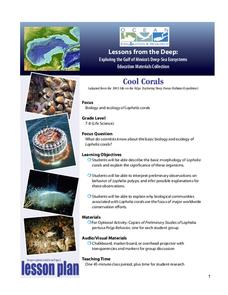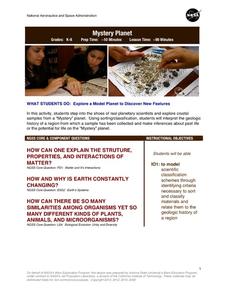Kenan Fellows
Microorganisms in Pond Water
That is living in the water? Groups of two to three view pond water with microscopes in order to find microorganisms. They draw pictures of the ones they find in their slides. The groups compare their drawings to pictures of common pond...
Science Matters
Mighty Microorganisms
How can you tell if a microorganism is helpful or detrimental to an ecosystem? Learners inspect slides or pictures of microorganisms and record their observations to identify those that are beneficial or harmful. They then pretend to...
Science Friday
Microorganisms on the Move
You can't b. cereus until you see this lesson! Young microbiologists learn to prepare deep well slides, observe two types of microorganisms, and compare and contrast their physical characteristics in this interactive and lively activity.
NOAA
Microfriends
Is there medicine found in the organisms that live deep below the surface of the ocean? The fifth lesson in a six-part series has learners team up to research bacteria and the relationship it has with nearly every living thing on Earth....
Baylor College
Microbes and Disease
Discuss how diseases have impacted human history. Divide your class into groups and assign each group one of the following: tuberculosis, malaria, plague, cholera, smallpox, and AIDS. They read up on, complete a concept map, and present...
Cornell University
Bacteria Take Over and Down
Bacteria outnumber all other forms of life on Earth. Scholars observe the growth of bacteria in petri dishes to understand their role in maintaining good health. Then, they observe the growth of bacteria after they introduce...
Howard Hughes Medical Institute
What van Leeuwenhoek Saw
When van Leeuwenhoek saw cells and single-celled organisms for the first time, he knew these small things were a big deal! Share his discoveries with young learners through a narrated video, model-building activity, and scale study....
NOAA
Deep-Sea Ecosystems – A Tale of Deep Corals
Many have debated which came first, the chicken or the egg, but this lesson debates which came first, the hydrocarbons or the carbonate reef. After a discussion on deep-sea corals, scholars receive a set of questions to research and...
Curated OER
The Marvels of Mud
Young scientists roll up their sleeves and get a little dirty in this three-day earth science investigation. Following the scientific method, children monitor the growth of algae in pond water samples in order to determine the role that...
NOAA
Deep-Sea Ecosystems – Cool Corals
Young oceanographers research deep sea corals that thrive on chemosynthesis. The lesson focuses on the biology of the animal, preferred habitat, associations, and interactions.
NOAA
Deep-Sea Ecosystems – Life is Weird!
A pool of brine in the deep sea can be up to four times as salty as the surrounding sea water. The deep sea ecosystem relies on chemosynthesis and the organisms that live there are often strange to us. The lesson focuses on researching...
NOAA
Deep-Sea Ecosystems – Entering the Twilight Zone
Imagine an ecosystem without any light or oxygen, where living things convert carbon dioxide into food. This ecosystem is thriving and might just be the largest ecosystem on our planet, yet we know very little about it. The lesson...
NOAA
Importance of Deep-Sea Ecosystems – How Diverse is That?
When judging diversity of an ecosystem, both species evenness and species richness must contribute. After a discussion of diversity and a guided example using the Shannon-Weaver function, scholars use the same function on two other...
Science Matters
Crawly Composters
Get your hands dirty with an interactive instructional activity that showcases the process of decomposing and returning nutrients back into the soil. After building a compost pile, pupils regularly observe the...
US National Library of Medicine
Science and Society: Preventing the Spread of Disease
Looking for a valuable resource on the spread of infectious diseases? Here is a lesson in which pupils simulate the spread of diseases and learn about how to prevent them from spreading. Class members read case studies about diseases,...
Baylor College
The Variety and Roles of Microbes
Mini microbiologists play a card game in which they group microorganisms by groups: virus, fungus, protist, or bacteria. Then they identify the roles different microbes play in the natural world and explore how humans effectively use...
Curated OER
Seed to Soup Organic Garden
Have your young biologists visit decomposition stations as they explore the process of organic material. This activity involves some set-up as kids will be visiting 13 desks to collect colored paper each representing a different element...
Nuffield Foundation
Working with Immobilized Enzymes or Microscopic Organisms
Let the lab be a catalyst to learn about enzymes. Scholars create alginate beads filled with yeast. As part of an investigation into enzymes, they see how these beads provide a catalyst to the reaction of glucose into ethanol.
Captain Planet Foundation
Rotting Away
What happens at the end of a plant's life cycle? Show kids the natural way that plants show that they're decomposing, as well as the importance of compost, with a lesson about living organisms. After reading Log Cabin by Anne Schreiber,...
Growing Classroom
Space Travelers
Groups of three scientists from the rocky planet Zog investigate the composition of soil so that they can take the information back to their home, create soil there, and begin to grow food.
American Society for Microbiology
”Build a Bacterium” Scavenger Hunt
An exciting activity has scholars use cell parts to build bacteria through cooperation with other groups. Each group has some of the cell parts needed, but they must trade with other groups to be able to fulfill their function as a...
NASA
Mystery Planet
What can one learn about a planet based on a small surface sample? Learners will explore artifacts from a mystery planet and see what they can determine about the planet based on the evidence in front of them.
Nuffield Foundation
How Good is Your Toilet Paper?
You'll never forget the importance of toilet paper and hand washing ever again. Scholars perform an experiment to model the transfer of microbes in the bathroom. They perform three trials to test the transmission of yeast using their...
























